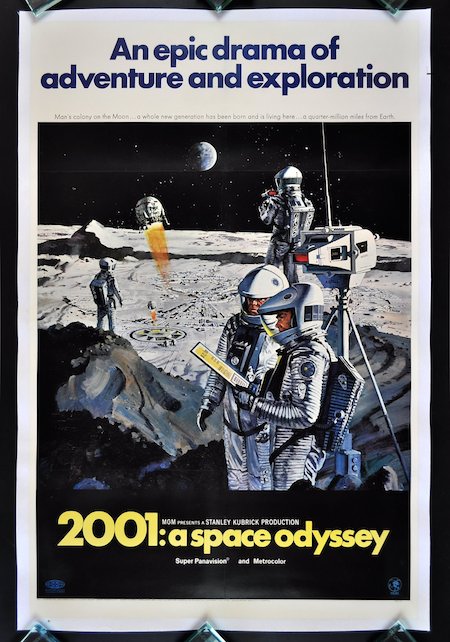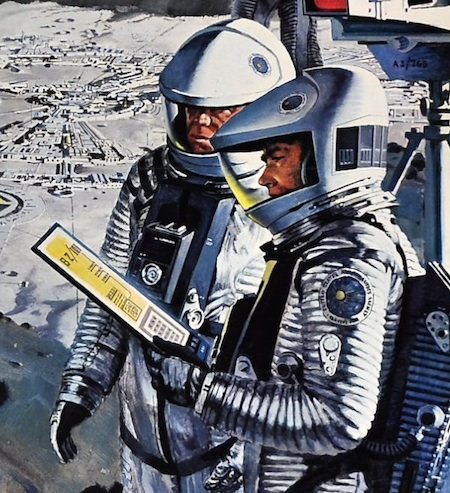Science Fiction
Dictionary
A B C D E F G H I J K L M N O P Q R S T U V W X Y Z
Will Astronauts Get iPads In Space?

The knobs and switches found in the spacecraft of the 1960's have been replaced by a glass cockpit, where the majority of commanding is done through software controls. Will astronauts be able to stop the old-fashioned (but eminently workable) twisting and flipping and go with the complex combination of taps, swipes, and swirls used on tablets?
(Concerns about tablets in space - NASA video)
“Many tasks performed inside a modern spacecraft will involve fine motor skills such as typing or interacting with a computer touchscreen,” says Kritina Holden, Principal Investigator for the Fine Motor Skills experiment now underway on the International Space Station. “In the future, astronauts will use portable computers for many tasks, including maintenance, training, medical treatment, science, time lining, and scheduling.”It is well known that microgravity can have a detrimental effect on the human body—muscles atrophy, bones weaken, and the immune system doesn’t function properly. Are fine motor skills affected as well?
The Fine Motor Skills experiment aims to find out.
“We really haven’t seen problems, but this type of performance hasn’t really been measured systematically in space,” says Holden, who works for Lockheed Martin in Houston, Texas. “Some experiments have shown that tasks take longer in microgravity than on the ground, but no study has yet looked at the types of tests that are included in this investigation.”
The Fine Motor Skills experiment studies the effects of long-duration microgravity on the type of fine motor task performance required to interact with computer-based devices such as tablet computers with touchscreens. Crewmembers will complete four types of tasks on an iPad: pointing, dragging, shape tracing, and pinch-rotate.
“Our real concern is making sure that future crewmembers can use their computer-based devices with accuracy onboard and on a planetary surface after a long voyage, for example to Mars.”
Science fiction readers were treated to an early view of tablet computers in space. Fans of the 1968 film 2001: A Space Odyssey got a clear view of a tablet computer right on the film's movie poster, which depicts an open pit dig on the lunar surface.

(Poster from 1968 film 2001: A Space Odyssey)
Here's what Arthur C. Clarke wrote in his book version 2001: A Space Odyssey about the newspad:
When he tired of official reports and memoranda and minutes, he would plug his foolscap-sized Newspad into the ship's information circuit and scan the latest reports from Earth. One by one he would conjure up the world's major electronic papers; he knew the codes of the more important ones by heart, and had no need to consult the list on the back of his pad...

(Tablet computer in 2001: A Space Odyssey poster)
In the book version, the newspad was only used in pressurized environments (as I recall). The movie poster version went a bit further; as my friend Winchell Chung - @nyrath points out, there are a few technical problems:
@Technovelgy
— Winchell Chung (@nyrath) November 19, 2016
Of course I'm pretty sure that iPads are not vacuum-rated
Via NASA.
Scroll down for more stories in the same category. (Story submitted 11/6/2016)
Follow this kind of news @Technovelgy.| Email | RSS | Blog It | Stumble | del.icio.us | Digg | Reddit |
Would
you like to contribute a story tip?
It's easy:
Get the URL of the story, and the related sf author, and add
it here.
Comment/Join discussion ( 0 )
Related News Stories - (" Space Tech ")
The New Habitable Zones Include Asimov's Ribbon Worlds
'...there's a narrow belt where the climate is moderate.' - Harl Vincent, 1931.
Will Space Stations Have Large Interior Spaces Again?
'They filed clumsily into the battleroom, like children in a swimming pool for the first time, clinging to the handholds along the side.' - Orson Scott Card, 1985.
Reflect Orbital Offers 'Sunlight on Demand' And Light Pollution
'I don't have to tell you about the seven two-mile-diameter orbital mirrors...'
Chrysalis Generation Ship to Alpha Centauri
'This was their world, their planet —
this swift-traveling, yet seemingly moveless vessel.' - Nat Schachner, 1934
Technovelgy (that's tech-novel-gee!) is devoted to the creative science inventions and ideas of sf authors. Look for the Invention Category that interests you, the Glossary, the Invention Timeline, or see what's New.
Science Fiction
Timeline
1600-1899
1900-1939
1940's 1950's
1960's 1970's
1980's 1990's
2000's 2010's
Current News
The New Habitable Zones Include Asimov's Ribbon Worlds
'...there's a narrow belt where the climate is moderate.'
Can One Robot Do Many Tasks?
'... with the Master-operator all you have to do is push one! A remarkable achievement!'
Atlas Robot Makes Uncomfortable Movements
'Not like me. A T-1000, advanced prototype. A mimetic poly-alloy. Liquid metal.'
Boring Company Drills Asimov's Single Vehicle Tunnels
'It was riddled with holes that were the mouths of tunnels.'
Humanoid Robots Tickle The Ivories
'The massive feet working the pedals, arms and hands flashing and glinting...'
A Remarkable Coincidence
'There is a philosophical problem of some difficulty here...'
Cortex 1 - Today A Warehouse, Tomorrow A Calculator Planet
'There were cubic miles of it, and it glistened like a silvery Christmas tree...'
Perching Ambush Drones
'On the chest of drawers something was perched.'
Leader-Follower Autonomous Vehicle Technology
'Jason had been guiding the caravan of cars as usual...'
Golf Ball Test Robot Wears Them Out
"The robot solemnly hit a ball against the wall, picked it up and teed it, hit it again, over and again...'
Boring Company Vegas Loop Like Asimov Said
'There was a wall ahead... It was riddled with holes that were the mouths of tunnels.'
Rigid Metallic Clothing From Science Fiction To You
'...support the interior human structure against Jupiter’s pull.'
Is The Seattle Ultrasonics C-200 A Heinlein Vibroblade?
'It ain't a vibroblade. It's steel. Messy.'
Roborock Saros Z70 Is A Robot Vacuum With An Arm
'Anything larger than a BB shot it picked up and placed in a tray...'
A Beautiful Visualization Of Compact Food
'The German chemists have discovered how to supply the needed elements in compact, undiluted form...'
Bone-Building Drug Evenity Approved
'Compounds devised by the biochemists for the rapid building of bone...'
